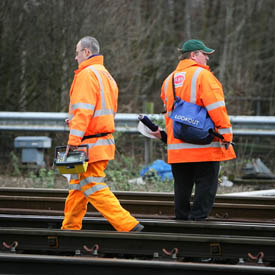Cashless trading is new weapon against metal theft
The government unveils plans to ban cash payments for scrap and metal in its battle to prevent the rising tide of scrap metal thefts.

Home Secretary Theresa May announced that the government will make it illegal to use cash to buy or sell scrap metal.
Unlimited fines for such offences, under the Scrap Metal Dealers Act 1964, will also be introduced.
Ms May said: “People who deal in stolen metal are criminals, pure and simple. Their activities are bringing misery to individuals and communities as well as damaging our economy. We’re putting a stop to cash payments and we’re imposing unlimited penalties on anyone who breaks the law.”
Urgent changes
The announcement was made hours after the Transport Select Committee released a report into cable thefts from rail networks. The report suggested cashless payments as a potential way of curbing scrap metal thefts, alongside greater powers for police and “urgent” legislative changes.
However, Channel 4 News understands that discussions to bring in new plans to ban cash payments had already been underway within the government.
People who deal in stolen metal are criminals, pure and simple. Theresa May
Earlier, Channel 4 News has reported how the government was believed to already be in discussion over proposals to introduce new legislation on scrap metal by making an amendment, or backing an existing amendment, to a new bill.
Cable thefts last year cost Network Rail £16 million and caused 35,000 delays and cancellations to rail services, the committee report said today.
Members of the committee urged the government to introduce a new offence of “aggravated trespass on the railway” in an attempt to increase penalties for offenders, after British Transport Police described current laws under the Scrap Metal Act 1964 as “Steptoe and Son legislation”.
Cashless trading
The government was also urged to give police investigating the crimes new powers to enter and inspect registered and unregistered scrap metal sites.
Stricter identification rules for sellers who trade metal at scrap yards is also suggested.
Committee chair, Louise Ellman MP said: “Current legislation for regulating scrap metal is out of date. The Government should introduce a new offence of aggravated trespass on the railway to help deter cable thieves.”
However the metal trade warned that cashless trading may drive thieves to sell metal to illegal, unregistered buyers. The British Metals Recycling Association’s director general Ian Hetherington welcomed the report, adding: “We are pleased that the committee has raised concerns that the proposed introduction of cashless trading may have ‘potentially negative effects’ upon legitimate dealers.”
Copper prices
He added that they did support a trial of cashless trading, rather than an immediate move to change the law.
Last year, around 500,000 passengers are believed to have deserted trains due to delays caused by cable thefts from railway lines, the Association of Train Operating Companies told the committee.
The committee called on train operators to ensure that compensatino owed to passengers for delays caused by cable thefts is fully passed on, and for more transparency about how much operators have paid to customers.
Cable theft is likely to continue, given that the price of copper has remained stable and expected to continue to fetch around $5,500 per tonne throughout this year despite the global economic downturn.
Network Rail said they awaited further concrete proposals to combat metal theft. Dyan Crowther, Network Rail’s director of operational services, said: “We believe that the only way to significantly reduce metal crime is to take away the illegal market and that more robust legislation and police powers are needed to achieve that.”
-
Latest news
-
Tim Booth of the band James’ on agism in music, topping the charts and AI6m

-
As India goes to the polls in the world’s largest election – what do British-Indians think?6m

-
Tees Valley: Meet the candidates in one of the biggest contests coming up in May’s local elections4m

-
Keir Starmer says public sector reform will be a struggle7m

-
Nicola Sturgeon’s husband Peter Murrell charged with embezzlement of funds from SNP1m

-




